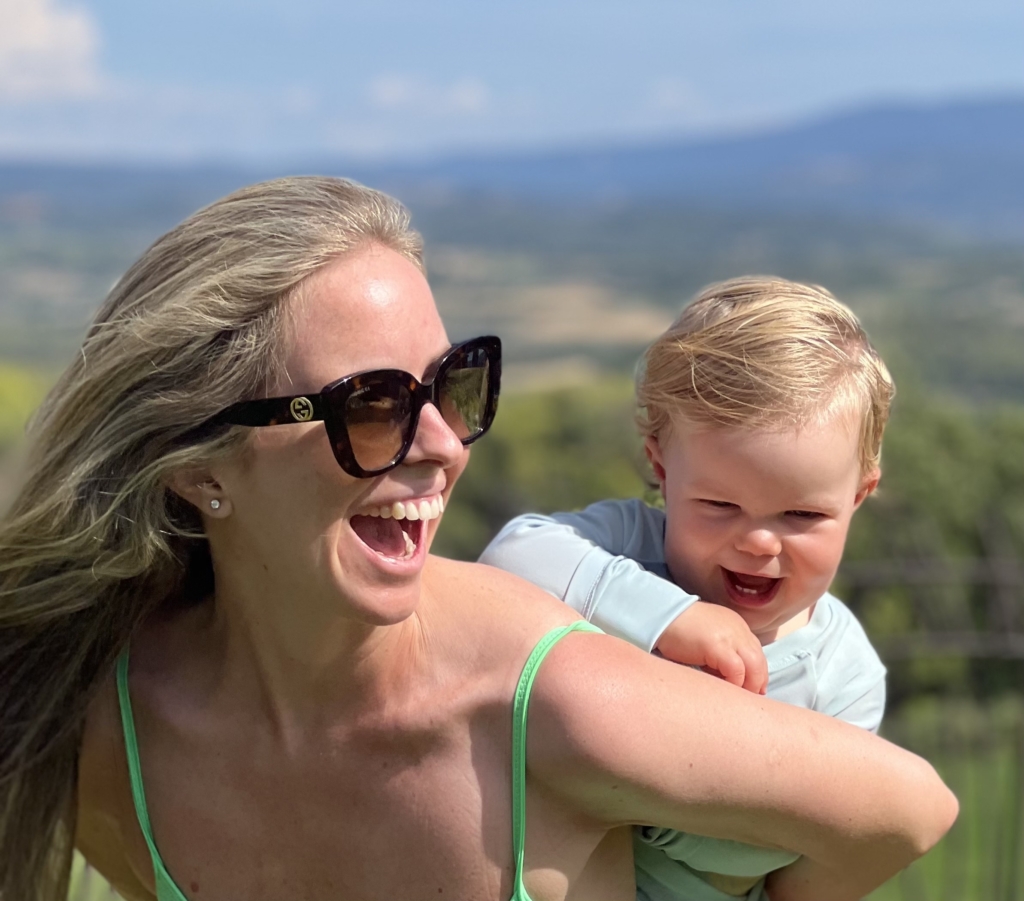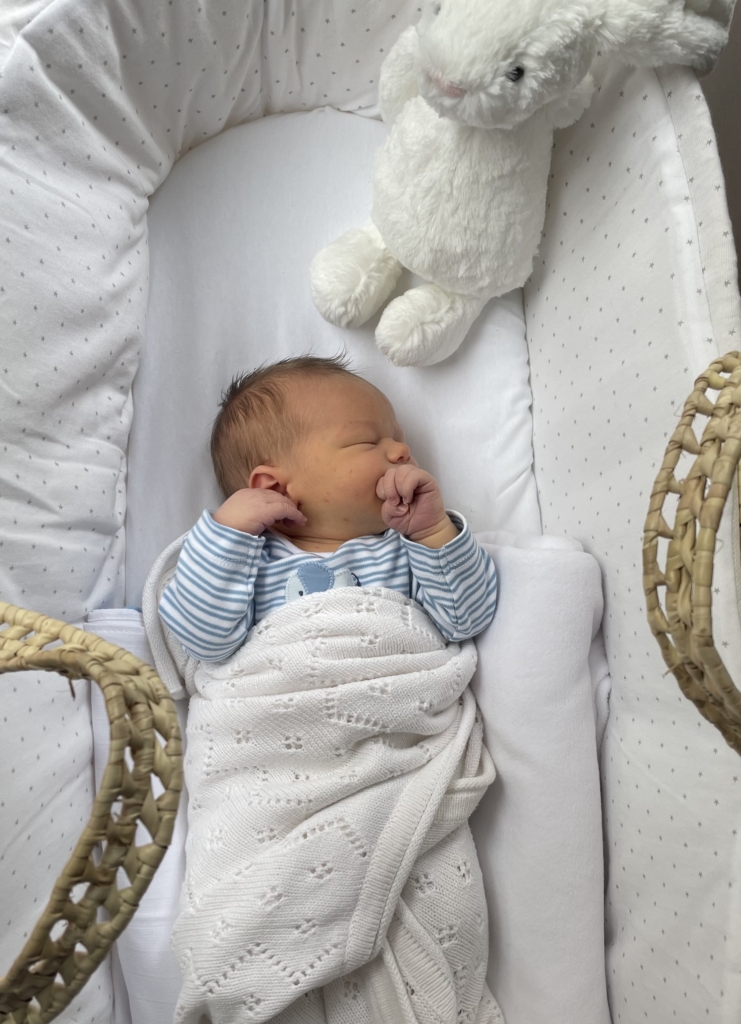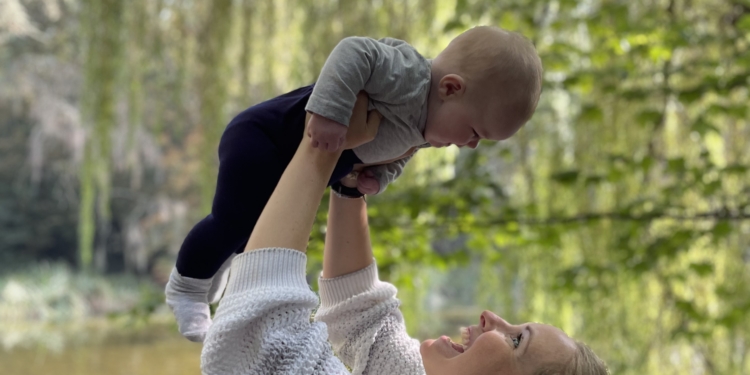In a world where chic parenting meets the cradle, the quest for the ultimate baby sleep routine takes center stage. Enter Lavinia, not just a seasoned sleep trainer but a maestro of serene slumbers, whose skills in the realm of sleep training has elevated the parenting experience. As a distinguished and certified infant sleep coach, Lavinia’s hands-on, personal touch has transformed the restless nights of many a tot, paving the way for self-contained, independent, and, dare we say, dream-worthy sleep habits. In an exclusive tête-à-tête with The Mini Edition, Lavinia unravels the haute couture of lulling little ones into the land of dreams effortlessly.

When it comes to sleep training, what are the key benefits for both parents and their little ones?
We live in a world that expects more from us than ever before. Our schedules are never ending, with most of us trying to squeeze in as much as possible to our day. Research shows stress levels are at a record high as no one seems to be able to just log off anymore, resulting in sleep reducing in length as people are putting it at the bottom of their to-do list.
That said, sleep training gets a bad reputation these days, people assume it just means letting your baby cry. It couldn’t be further from the truth, we teach and show our children how to walk, talk and eat, so why not sleep? As a sleep coach, it is a huge ambition of mine to spread the word about the importance of sleep, not only for parents but for children too.
The benefits of sleep are huge and well researched, not only should we not be neglecting our sleep needs, but they should be our absolute priority, for so many reasons. Sleep helps regulate appetite, restores our immune system, reduces the risk of cancer, maintains a healthy gut microbiome. Fact – sleeping less than six hours a night has been linked to a higher risk of a heart attack or stroke by 200%.
Our human body requires sufficient sleep to help the brain store memories and restore the brain’s capacity to take on new information. Your mind also benefits hugely from healthy sleep habits; it will improve your mood, regulate your emotions, not to mention reduces the risk of depression & anxiety and even lowers the chance of developing dementia.
You can see, just from this snapshot, we really cannot underestimate the importance of sleep on our lives and the detrimental effects sleep deprivation can have on us.
Furthermore, for the little ones, sleep plays a major role in a baby’s development. Sleep is literally the time they grow and develop the most. The first year of life is when we see the most prominent growth spurt, yet society seems to have this acceptance of bad sleep in that first year! How does that make sense?
Healthy sleep habits will optimise your baby’s wakeful periods, therefore enhancing the time a baby can learn new skills. Sleep is also a major factor in ensuring that your baby has a healthy immune system. A well-rested baby is going to be a calmer and happier baby, which I think we can all agree equates to happier parents, thus creating a better environment for all of the family to succeed in.
Can you share some fundamental principles for establishing a bedtime routine that promotes a sense of security and ease for the child?
A bedtime routine is one of my key go-to’s for all of my clients. Depending on the age of your little one there are some different things to look at but here are my top tips:
- Start your wind down as soon as possible. After a busy day, I like to try and begin the bedtime routine, heading upstairs at about 5.45pm (if possible).
- Always ensure you are giving your little one your utmost attention, this is the time of day when it’s key to prioritise them, to fill their love bucket and leave the chores for another time. All the eye contact, one to one play, kisses and cuddles.
- Soak in a lovely warm, deep bath, you could bring in some calming lavender too and again a great time for one-to-one play, connection and laughter.
- After a bath, for the babies (and toddlers who are willing!) a lovely soothing massage is amazing to build connection and helps with the build up of any wind from the day, aiding digestion before their nice long sleep.
- I finish with their milk, a couple of stories, your favourite song and your sleepytime sentence.
- My biggest piece of advice for the toddlers, is to set your boundaries at bedtime, their developing brain craves autonomy so stick to your guns, keep consistent, shower them with love and put that joy back into bedtime!
We love our bedtime routine at home, we keep it exactly the same every night so my two know exactly what to expect, which means we really can bring the joy to bedtime.
How does your personalised approach differ from generic sleep training methods, and what makes it uniquely effective?
I like to think my ‘no one-size fits all’ approach makes me stand out. No one baby is the same so at Dare to Dream Sleep Consultancy, we use an entirely holistic and responsive sleep coach method to suit every little one and their individual needs. I am here to listen and guide you but of course whilst respecting your boundaries and above all I will always, always go with your gut. I offer expert advice but work with your parenting style. Everyone is unique, nonetheless I will leave you with the right skills, so you feel empowered, well rested and happier parents.
Many parents worry about the potential distress caused during sleep training. How do you address and mitigate these concerns?
This is where ‘sleep training’ gets a bad rep, people associate the word with leaving your baby to cry. I rarely refer to what I do as sleep training because of the stigma attached, as it really couldn’t be further from the truth. In fact, the majority of my work revolves around everything but sleep! So much (if not all) of a baby drifting off into beautiful slumber, originates from their comfort and day routine. For me it’s all about looking at the WHY, the root cause and working on that. This could be anything from comfort levels, an imbalance of daytime sleep, food intake, allergies & intolerances and how your little one self-settles.
There is so much noise in the sleep industry and so many parents are unsure about what advice to take or who to listen to. On one hand you have sleep consultants telling you, you are creating a rod for your own back by co-sleeping/rocking/assisting your baby to sleep. On the other there are consultants, even medical professions who tell you that ‘sleep trainers’ will teach emotional suppression and lack of resilience for your little one. Naturally, this conflicting advice, leads to a whole load of distress for the already sleep deprived and anxious parent.
Should we really be telling the mother who needs to go back to work and cannot afford to be up all hours that by teaching her baby independent sleep she is really teaching emotional suppression? Or those mums out there who have longed to cuddle and co-sleep all night that they are spoiling their baby? Of course not. My point is, you do you! You know what is best for your family and if it is working for you then that is all that matters. As soon as it’s not working, that’s when I’m here for you to create a plan that does!

Could you elaborate on the importance of consistency in sleep training and how it contributes to long-term success?
We know from research that children feel secure, happy and comforted with a consistent routine in place. The same goes when a parent decides to work on their little one’s sleep. It can be a big change for them so to help make it go as smoothly as possible, sticking to the new routine will make it easier for them to understand. Going back and forth from the new routine to old habits will not work and will be too confusing. Before working with a client, I will always ensure both parents are ready for the change, they have time to focus on their baby’s sleep (no holidays coming up) and most importantly no underlying issues (health wise) that could be affecting sleep.
What role do environmental factors play in shaping a conducive sleep environment for babies and toddlers?
We want to create the ultimate sleep set up for our little one’s to drift off soundly. This is often referred to as sleep hygiene. The key factors at play are temperature, darkness, noise and sleep position. Getting these right are essential factors to ensure your baby gets the best sleep they can. I often hear people wanting their baby to be able to get used to sleeping in noise and light. Some babies are more than capable to do this, however every baby is different and if he/she is struggling with their sleep it’s one of the first things I will look at changing up as it can really help.
Are there any specific signs or cues that parents should look for to determine if their child is ready for sleep training?
Only the parent knows when they are ready to sleep coach their baby. You can start working on sleep from the very beginning. We just look at it a little differently, from wind, awake windows, settling and a simple pattern of a sleep – eat – awake routine. Shaping sleep from the beginning is a huge passion of mine, because it means you never have to actually work on sleep! My two children are fantastic sleepers, they absolutely love their bed and I really couldn’t imagine it any other way. The only time when I wouldn’t encourage working on sleep is firstly if I see any red flags that could be a medical issue at play or secondly when I don’t feel the parent is ready. For example a lot of co-sleeping parents, may feel pressure from society to change their sleep habits and when I dig into they ‘why’ some conclude they aren’t actually ready.
How can parents strike a balance between attending to their child’s needs and fostering self-sufficiency through sleep training?
I always find this is one of the great paradoxes in the sleep industry. So many may fear working on their child’s sleep due to fear it means you are neglecting your child’s needs. That said, sleep deprivation is real and how it can change your energy levels, mood, and patience levels are huge. Getting several hours of good quality uninterrupted sleep, will surely make you show up as the best parent you can be. At Dare to Dream Sleep Consultancy I have several sleep coaching methods to suit every individual parent’s needs. We show up, always with reassurance for your little one but ultimately teaching them they can drift off themselves, what an amazing life skill to impart?!
What advice do you have for parents who co-sleep and are considering transitioning their child to an independent sleep routine?
The one piece of advice is to make sure they are ready. The majority of the world co-sleeps, it is perfectly normal so I’d hate the thought of a client coming to me to instil independent sleep just because society says so. It’s really important to me that my clients are invested in the sleep coaching method and have the capacity to be consistent. The most common reasons I see are parents going back to work or parents wanting to focus on their relationship. We can go as gently as they like and I will always carry out an in-depth consultation to come up with a sleep plan that they are happy with.
Can you provide a glimpse into the typical timeline for parents to witness noticeable improvements in their child’s sleep patterns through your approach?
On average, parents should see an improvement in their child’s sleep as soon as 5-7 days after our initial phone consultation, sometimes less. I love the thought that someone could be reading this today and by next week your sleep could be solved! This will forever more be my mission.
Related Article: A Guide To Travelling With Small Children






